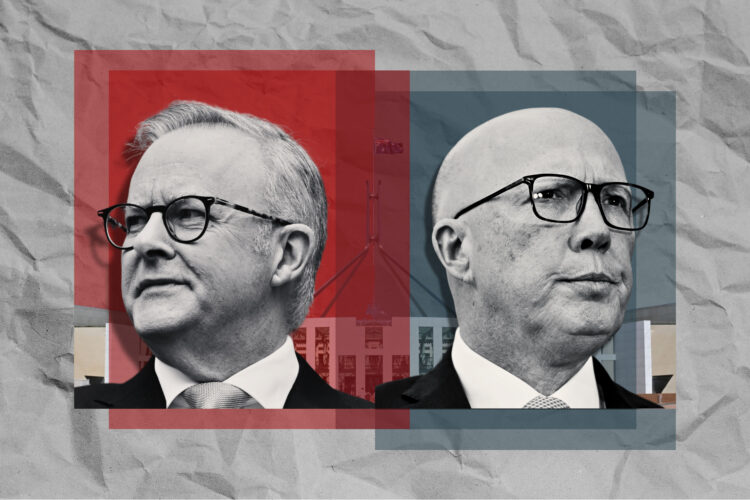Most Independent / Other voters support crossbench to negotiate for best outcomes for nation and electorate
New Australia Institute polling shows that more than twice as many Australians support a power-sharing arrangement in the next term of parliament as oppose one (41.7% vs 19.7%).
And, among Independent and Other voters, more say that independent and minor party MPs holding the balance of power should support the party they believe can negotiate the best policy outcomes for Australia (47.8% and 49.8% respectively) than any other option.
An overwhelming majority (70%) of Australians think that the Senate should review and scrutinise every government policy on its merits, while just 12.2% think that the Senate should support every policy the government took to the election.
- Twice as many Australians support an arrangement in the new parliament where the major party shares power and responsibility with crossbench parliamentarians as oppose it (41.7% vs 19.7%). 38.6% don’t know/not sure.
- ALP voters (47.5% support, 11.8% oppose), Greens voters (62.2% support, 5.0% oppose), Independent voters (47.9% support, 10.4% oppose), and Other voters (48.2% support, 14.0% oppose) all strongly support a powersharing Parliament
- Conversely, Coalition (29.6% support, 34.7% oppose) and One Nation voters (28.4% support, 31.4% oppose) oppose power-sharing arrangements more often than they support them
- If independent and minor party MPs hold the balance of power after the federal election:
- Most Independent voters and Other voters think they should support the party they believe can negotiate the best policy outcomes, either for Australia or for the MP’s local electorate (total 58.9% and 67.9% respectively).
- 17.9% of Independent voters and 14.4% of Other voters think crossbench MPs should support ALP to form government; 4.0% Independent voters and 6.7% Other voters think they should support LNP to form government
- Unsurprisingly, 60.6% of ALP voters believe they should support the Labor Party to form government, while 65.4% of Coalition voters believe they should support the Coalition to form government.
- As a whole, 28.6% of Australians think they should support the Labor Party to form government with Anthony Albanese as Prime Minister, while 25.5% of Australians think they should support the Liberal / National Coalition to form government with Peter Dutton as Prime Minister
- 27.0% of Australians think they should support whichever party the MP believes they can negotiate the best policy outcomes for Australia, and a further 7.2% think they should support the party negotiating the best policy outcomes for their electorate
- Seven in 10 Australians (70%) think that the Senate should review and scrutinise every government policy on its merits, just 12.2% think the Senate should support every policy that the government took to the election.
- The vast majority of Australians (72.0%) did not think talk of a possible ‘hung parliament’ or ‘minority government’ influenced they way they voted, or intended to vote. 13.7% said it did influence the way they voted.
“The Australia Institute’s polling research shows that voters aren’t buying dark talk of ‘coalitions of chaos’ or ‘hung parliaments’. Most states and territories have experienced power-sharing parliaments in the last 20 years, so Australians have real-world experience that these parliaments can be popular and effective,” said Bill Browne, Democracy & Accountability Program Director at The Australia Institute.
“Over the past four decades, Australians have voted for minor parties and independents in greater numbers. No major party or coalition has won a majority of the popular vote since the 1970s. A parliament where no one party has a majority of seats is a natural consequence of the declining major party vote.
“Power-sharing has been a feature of parliaments for as long as they have existed. Power-sharing parliaments are common in Australia, particularly at the state and territory level, and they can be very successful.
“Political commentators and strategists who focus on the two-party ‘horse race’, neglecting the growing minor party and independent vote, will increasingly be caught out by seat upsets.
“It is under power-sharing parliaments that the ACT adopted truth in political advertising laws, whistleblower protections were achieved in NSW, the Royalties for Regions package distributed mining and petroleum royalties to WA regional communities, the ACT achieved 100% renewable energy and Tasmania passed one of the most progressive freedom of information acts in the country.
“At the federal level, the 2010–2013 power-sharing parliament and Gillard Labor government passed legislation at a higher rate than any other, including ambitious legislation like the NDIS, Clean Energy Future Package, cigarette plain packaging and expanding Medicare to dental for children.”
YouGov was commissioned to conduct a national survey of 1,500 voters on behalf of The Australia Institute between 24 and 29 April 2025, using an online survey polling methodology. Full details are provided in the methodology statement attached to this media release. The poll is compliant with the Australian Polling Council’s requirements. The margin of error on the effective sample size is 3.27%.

